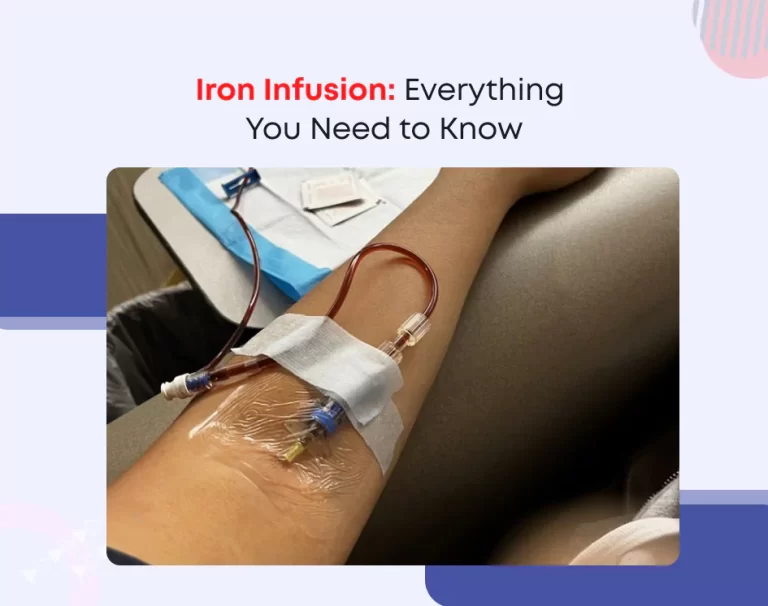
Iron Infusion: Everything You Need to Know
Iron is one of the minerals that are vital for the normal functioning of our body. It is involved in the formation of haemoglobin, a protein in red blood cells responsible for the transportation of oxygen in your body. From the research, it is understandable that if your iron levels are low, you may feel tired all the time, dizzy, and even have other health complications.
For some, diet changes or oral supplements aren’t enough to correct iron deficiency. In such cases, iron infusions can be effective. This blog will briefly explore what iron infusion is, how it works, its benefits, possible side effects, and important details to consider before opting for this treatment.
What is an Iron Infusion?
Iron infusion involves administering iron directly into the bloodstream through a process called intravenous (IV) therapy. This method is recommended when the body requires an immediate boost in iron levels or when oral supplements do not work. While using pills that take time before they are absorbed in the body system, an infusion makes it possible for the body to access iron instantly, which will be effective.
Why Might You Need an Iron Infusion?
It is usually administered to patients with severe anemia or other comparable conditions that cannot be treated through changes in diet and the use of iron tablets. Some of the main reasons why someone might need an iron infusion are:
Severe Iron Deficiency Anemia
A state of the human body where the levels of iron are low so that it can’t produce healthy red blood cells. This increases the risk of extreme fatigue and weakness as well as various other dangerous complications of severe anemia. Iron infusion replenishes your body iron faster than almost any other food and enhances energy status and health.
Poor Absorption of Oral Iron
Everyone cannot digest iron from supplements or foods in equal quantities for several reasons. This implies that it might be insufficient to treat deficiency through oral supplements as they were never absorbed correctly. Infusions can be administered directly into the bloodstream, meaning that they do not go through the digestion phase.
Chronic Conditions
Diseases such as chronic kidney disease, heart failure or inflammatory bowel disease cause low levels of iron in the body. Additionally, conditions such as cancer, diabetes, and hypertension often require long-term treatment, making it crucial to maintain proper iron levels. Iron infusions can help regulate iron levels and manage the side effects associated with these chronic illnesses.
How Does an Iron Infusion Work?
Iron infusion is quick and is usually done in a clinic or a hospital. Here’s a step-by-step overview:
Preparation
Medical Assessment: Before the infusion, you’ll have blood tests to determine the iron levels in your body.
IV Insertion: A small needle puncture is made on one of the veins, mainly in your arm, to initiate the infusion process.
The Infusion Process
Iron Solution: The iron is added to a saline solution, which is administered to your bloodstream drip-likely.
Duration: The whole process normally takes 30 minutes to a few hours, depending on the dose.
Monitoring: When receiving the infusion, medical staff will be on the lookout for any side effects from the solution.
Aftercare
Observation: After the infusion, you will be monitored for a short while to check for any of the immediate side effects.
Follow-Up: Your doctor may also request other blood tests for iron to see whether the treatment is effective.
The infusion process is safe, and one might notice significant improvement in their condition in several days to weeks.
Benefits of Iron Infusions
Iron through intravenous has some benefits compared to oral iron supplements, especially for patients with special health conditions. Below, we have the breakdown of benefits.
Rapid Increase in Iron Levels
Quick Absorption: While iron supplements have to be taken orally and then absorbed into the bloodstream, infusions get the iron directly to your veins and, therefore, are more effective.
Immediate Relief: The symptoms, such as tiredness and exhaustion, can be easily alleviated right after the procedure.
Improved Energy Levels
Combats Fatigue: There is nothing as disruptive to one’s health as waking up each morning only to be drained of energy right through the day, a problem known as iron deficiency. That means infusions assist in recovering the strength.
Better Physical Performance: Iron infusions increase the levels of iron in your body to a point where the body can produce high amounts of haemoglobin, translating to better stamina.
Effective for Those with Absorption Issues
Bypasses the Gut: Those with malabsorption of the iron in the gut can always opt for iron infusions.
Higher Success Rate: There’s no argument that infusions better solve solutions in circumstances where gastrointestinal syndromes impede bulk intake.
Iron injections can also benefit those with severe anemia, mainly because a person will feel immediate relief from his condition.
Potential Side Effects of Iron Infusions
While iron infusions are generally safe, they can cause side effects in some individuals. It’s important to be aware of these potential risks.
Common Side Effects
- Headache: Some people experience mild headaches after an infusion, which usually subside quickly.
- Dizziness: Feeling lightheaded or dizzy is another common side effect, but it’s typically short-lived.
- Muscle or Joint Pain: Aches and pains may occur after the infusion but are usually temporary.
Serious Side Effects (Rare)
- Allergic Reactions: In rare cases, people may have an allergic reaction to the iron solution, leading to symptoms like rash, itching, or difficulty breathing.
- Low Blood Pressure: A sudden drop in blood pressure can occur during the infusion, causing faintness or dizziness.
- Iron Overload: Excessive iron can accumulate in the body, leading to a condition called hemochromatosis, though this is uncommon.
If you suffer any serious side effects, you should contact your healthcare practitioner immediately. Most side effects are mild and manageable, but knowing the risks can help you make an informed decision.
How to Prepare for an Iron Infusion?
If you’re scheduled for an iron infusion, the following are a few steps you can take to ensure a smooth experience:
Stay Hydrated
- Why it Matters: It’s also essential to maintain good hydration as it will help veins, and if an IV is needed before the infusion, it will not be as painful.
- How to Prepare: You should try to have several glasses of water in the course of preparing for the appointment.
Eat a Light Meal
- Why it Matters: Sometimes you may feel you have a spinning head or even nausea, and therefore, it is advisable to take a small snack before the infusion.
- What to Eat: A small snack should be taken.
Wear Comfortable Clothing
- Why it Matters: It is going to be a sit-thought event, so don’t wear anything that you will feel uncomfortable in for long hours.
- What to Wear: A person should wear very comfortable clothing that does not hinder arm movement in any way.
Thus, if you would like to get an effective result of the therapy and decrease the risk of possible complications, it is better to follow these simple recommendations.
Aftercare and What to Expect Post-Infusion?
After your iron infusion, a few things you should keep in mind are:
Rest and Recover
- Why it Matters: It is wise for some people to feel weary after the infusion; therefore, they should avoid exhausting themselves.
- What to Do: Try to avoid over-activity and plan the day ahead so that there will not be a need to move around much.
Monitor for Side Effects
- Why it Matters: One should never forget any possible side effects, especially within the first day.
- What to Watch: To avoid the effects of bipolar disorder, one should look out for indications such as dizziness, rash or difficulty in breathing.
Follow-Up Appointments
- Why it Matters: Your doctor may wish to measure your iron levels both before and after the infusion, say a few weeks after the procedure.
- What to Expect: You should expect to have a repeat blood test to check whether the iron has risen to acceptable levels.
Following your doctor or therapist’s instructions, you will be able to make the most out of your iron infusion and feel the improvement and stabilisation of your iron level.
Winding Up
Iron infusion is given when the patient has one of the severe forms of iron deficiency or, more probably, anemia, and it proves very useful because it introduces iron in the body in large traces. Iron can also help improve your quality of life by reducing some of the effects of chronic diseases or other illnesses, such as fatigue, dizziness, and weakness as a result of poor or inadequate absorption of the mineral by the body.
In other words, it can be very useful in the struggle for health if all the preparation and other measures stipulated by such care are provided and performed correctly. If you are considering having an iron infusion, it is recommended that you consult your doctor to tell you whether it is good for you to undertake it or not.






